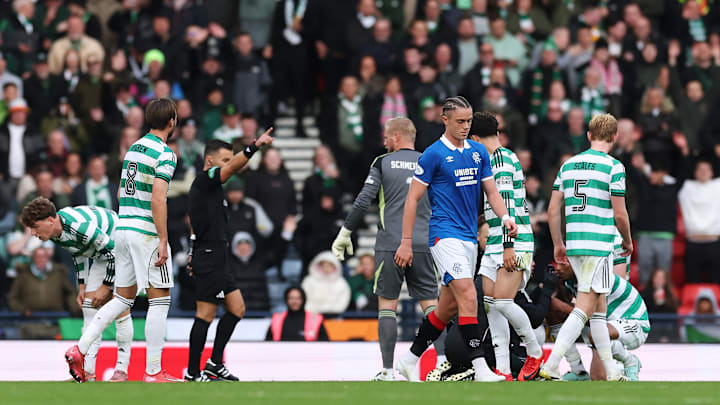Rangers exited the Scottish League Cup at Hampden with a 3–1 extra-time defeat to Celtic, but the match will be remembered as much for the officiating as the football – as predicted.
Head coach Danny Röhl refused to publicly attack the referee, Nick Walsh, after the final whistle. Captain and scorer James Tavernier did not
The match pivoted on Thelo Aasgaard’s 38th-minute red card. The midfielder was shown a straight red after stretching to bring down a bouncing ball, catching Tony Ralston high on the follow-through.
Röhl accepted the decision in principle, but the captain’s frustration was directed not at the red itself, but at the lack of consistency that followed.
The skipper said: “If that’s a red, fine. But then I expect the same decisions the other way.”
Tavernier was referring to two moments that followed: Austin Trusty catching Jack Butland in the face with his studs, and Daizen Maeda connecting heavily with Mohamed Diomande’s midriff. Both challenges were seen by officials.
Neither resulted in a card.
Tavernier reflected by saying: “Jack [Butland] gets stood on the head and Dio gets studs in the belly.
“The referee said the red was about force, but where is that applied the other way?”
The decision not to show Anthony Ralston a second yellow in the 81st minute was the flashpoint that will dominate discussion.
The Celtic defender blocked Djeidi Gassama’s goal-bound shot with his hand and the penalty was given, but no dismissal despite the Scotland full back already on a yellow card.
Rangers equalised through Tavernier’s penalty to force extra time, but the moment again fed into the same theme we have seen in recent crucial Old Firm matches: Celtic received the benefit of the doubt. Rangers did not.
Röhl, however, stayed deliberately measured post-match when he said: “It’s not my part to speak about the referee. My focus is on my team.”
He instead highlighted Rangers mentality, ten men for over 80 minutes, four one-on-one chances created, tactical adaptation and renewed belief.
Butland, Tavernier and Diomande all required treatment after clashes that went unpunished.
Aasgaard’s dismissal came instantly. The penalty resulted in no caution. Trusty remained on the pitch. Maeda avoided a second caution despite multiple fouls.
It is the pattern, not the single moment, that has opened the debate once again.
The club is expected to raise the decisions formally through the usual SFA feedback channels, rather than through public confrontation but fans all agree – Patrick Stewart should tackle this publicly and head on.
Röhl does not want energy spent on grievance, but the players tone made clear that the frustration is real, and shared between the squad and fanbase.
Rangers did not lose solely because of the officiating, missed chances in key moments cost them. But the sense remains: the margins were tight, and they did not fall evenly.
Tavernier summarised it best: “We have to own our part. But the decisions have to be consistent.
“That’s all we ask.”
The UEFA Europa League resumes Thursday against Roma at Ibrox, where the noise from Hampden will still be echoing, not just in the stands, but in the dressing room.
